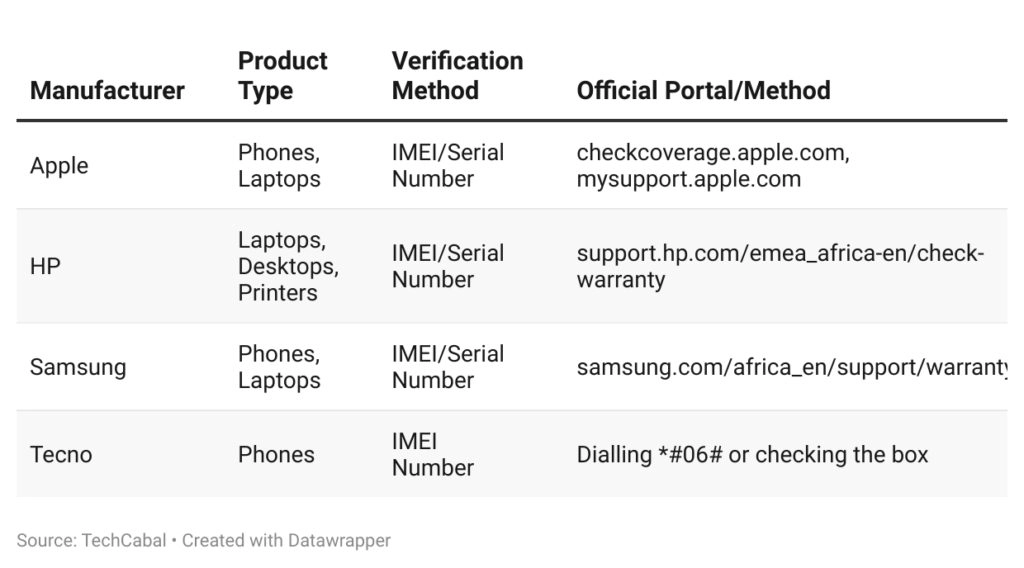If you buy a phone or laptop in Nigeria, theres always the risk of ending up with a fake. Counterfeit tech gadgets are everywhere, from outright clones to refurbished items sold as brand new, or gadgets with fake software and swapped-out parts.
Counterfeits arent just frustrating, theyre costly. Nigerians lose billions annually to fake gadgets, with some reports saying up to 40% of tech gadgets in the market are counterfeit. Imagine spending over �300,000($190) on a laptop that stops working in a few months. Beyond the financial implications, fake gadgets can even put lives at risk, like faulty chargers causing house fires.
This guide is here to help you avoid falling victim.
Start with the basics. Original devices always come in sealed, branded boxes with clear printing. Watch out for:
- Unsealed or plain packaging
- Blurry logos or spelling errors
- Cheap stickers instead of engraved or printed branding
Look at the device itself. A genuine laptop or phone should feel solid, not flimsy. The screen should be bright and clear, not dim or blurry. For phones, the screen should feel like glass, not plastic. Accessories like chargers and cables should also feel sturdy and fit properly.
Every phone has a unique IMEI number (International Mobile Equipment Identity). Dial *#06# or check the box/settings to find it. Then, confirm it on the official brand website or trusted sites like IMEI.info.
Scammers sometimes fake software details, making a device look like it has more storage or RAM than it does. Dont trust only the About Phone screen; always cross-check the IMEI to be sure.
The way a seller behaves tells you a lot. Be cautious if they:
- Rush you to make a payment
- Get angry when you test the gadget
- Refuse to issue a receipt or warranty
Trusted retailers like SLOT usually give at least a 1-year warranty and a return policy, said Desmond, who owns and runs DesonTechHub, a small phone shop tucked between two busy stalls at Computer Village in Ikeja, Lagos.
Thats a good sign of accountability. But you also need to be sharp because there are also market tricks. Once youve tested a device, always hold onto it; dont let the seller take it back to repackage it out of sight. And once youve paid, leave the market immediately with your item.
When we visited Computer Village in Ikeja, shop owners and customers were quick to share practical rules for avoiding counterfeit or stolen devices.
Desmond, who runs DesonTechHub, put it simply: Dont buy from random street sellers. If the seller cant give you a receipt or warranty, walk away. Always check the IMEI number before you pay, and test the phone thoroughly right in front of them.
A nearby trader, who asked not to be named, warned about the risks of unknowingly buying stolen phones. Ive seen people get into serious trouble after buying stolen phones without knowing. Imagine police tracing the device back to you. Thats why referrals and known shops are safer. Test every feature on the spot, camera, Wi-Fi, Bluetooth, dont just check the body.
Chioma, a sales rep at BrightTech Hub, a small laptop repair stall, emphasised vigilance. Never let the seller take the phone or laptop away to repackage after youve tested it. Once it leaves your sight, you cant be sure its the same device. Hold it yourself, and carry it home yourself.
Beyond market wisdom, sellers in Computer Village stressed that big tech brands already provide tools to verify authenticity.
HP laptops, for example, come with a hologram or QR code on the box, Desmond of DesonTechHub explained. You can scan it or enter the serial number on HPs website. Same with Apple and Samsung, they have online portals where you can check the IMEI or serial number. If it doesnt show up, dont buy it.
Chioma of BrightTech Hub offered a simpler trick for budget smartphone brands: For TECNO or Infinix, just dial *#06# to display the IMEI, then compare it with the number on the box. If they dont match, its fake. Simple.
Trusted retailers also matter. Tunde of Zit Gadgets, an authorised reseller, said: Shops like SLOT, Technocrat, or my own store issue receipts, warranties, and return policies. That accountability is what separates us from the boys on the street. Online, the official Jumia stores are also safe because they give you proof of purchase.
Government and private efforts are also in play. Desmond pointed to initiatives from the Standards Organisation of Nigeria (SON) and NAFDAC, and to apps like Chekkit that let buyers scan QR codes to confirm originality.
From roadside stalls to brand websites and mobile apps, the message was consistent: buyers dont have to rely on a sellers word alone; they already have the tools to protect themselves.

These official tools are designed to empower consumers and bypass the need to trust a sellers word. The existence of these resources is a direct acknowledgement from manufacturers of the global counterfeiting problem and their commitment to providing a solution. However, it is ultimately up to the consumer to use them.
Fake gadgets are everywhere in Nigeria, but you dont have to fall for them. Safe buying comes down to caution: knowing who youre buying from, checking what youre paying for, and verifying before you hand over cash. The more consumers take these steps, the harder it becomes for fake tech gadgets to thrive in the market.



